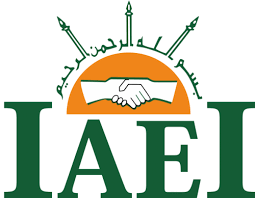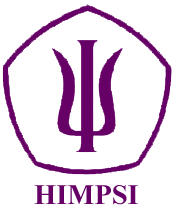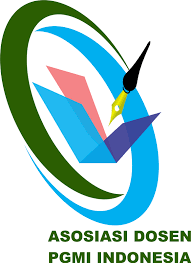ANALYSIS OF ISLAMIC EDUCATION IN THE ERA OF KHULAFA AR-RASHIDIN AND ABBASID DINASTY
Abstract
This study aims and analyze the education of the Khulafa ar-Rashidin and Abbasid eras. The method of this type of research is library research, where the researcher tries to collect data that has a relationship with the theme being discussed. The data is obtained from various documents such as; books, papers, journals, and articles related to education in the era of the khulafa ar-Rashidin and the Abbasids. Then, the researcher is the research instrument itself where the work of determining research, selecting data sources, collecting data, assessing data quality, analyzing data, elaborating, and the conclusions of the findings are carried out by the researcher. The collected data were analyzed critically and synthesized which then presented the results of the study that answered the objectives of this research. Then, the results of this study found three main things, namely: first, educational materials in the era of Khulafa ar-Rashidin included reading and writing, grammar, hadith, sya'ir, nahwu, sharaf, basic mathematics, stories, swimming, archery, and riding, memorizing Qur'an and examines the basics of Islam, namely monotheism education, prayer, etiquette in the family and society, personality and defense, and security. This material is given in general because there is no educational level. Meanwhile, in the Abbasid era, educational materials included compulsory and optional subjects. Compulsory lessons such as the Qur'an, prayer, nahwu, sharaf, Arabic, and reading and writing. Optional materials such as arithmetic, nahwu, sharaf, Arabic, poetry, and history of the Arabic. Second, the educational methods of the Khulafa ar-Rashidin era were lectures, memorization, exercises, and discussions. While the methods of Islamic education in the Abbasid era were oral, written, memorization, discussion, and discovery or research methods. Third, the education system of the Khulafa ar-Rashidin era, namely the halaqah and Abbasid systems, namely the halaqah and classical systems or formal and non-formal systems.
Downloads
References
Ahmad, Fazl. 1961. Heroes of Islam Series: Abu Bakr, the First Caliph of Islam. Sh. Muhammad Ashraf.
Arifin, Muhammad. 2019. Pengantar Ilmu Pendidikan. Jakarta: GUEPEDIA.
Bennison, Amira K. 2009. The Great Caliphs: The Golden Age of the ’Abbasid Empire. New Haven: Yale University Press.
Bianquis, Thierry, and Ann K. S. Lambton. 1989. “State and Government in Medieval Islam (An Introduction to the Study of Islamic Political Theory: The Jurists).” Journal of the Economic and Social History of the Orient 32 (1): 110. https://doi.org/10.2307/3632158.
Bisin, Alberto, A. Seror, and T. Verdier. 2019. “Religious Legitimacy and the Joint Evolution of Culture and Institutions.” Advances in the Economics of Religion. https://doi.org/10.1007/978-3-319-98848-1_20.
Brickman, William W., and Mehdi Nakosteen. 1966. “History of Islamic Origins of Western Education, A.D. 800-1350.” History of Education Quarterly 6 (1): 76. https://doi.org/10.2307/367012.
Chaeruddin, B. 2013. “Pendidikan Islam Masa Rasulullah Saw.” Jurnal Diskursus Islam 1 (3): 421–36. https://doi.org/10.24252/jdi.v1i3.6639.
Chaney, Eric. 2013. “Religion and the Rise and Fall of Islamic Science Extremely Preliminary and Incomplete.” Undefined. https://www.semanticscholar.org/paper/Religion-and-the-Rise-and-Fall-of-Islamic-Science-Chaney/1826bb831dd28d13868645f134ca33ff1e11cc16.
Clarke, Nicola. 2016. “Routes and Realms: The Power of Place in the Early Islamic World; Mapping Frontiers across Medieval Islam: Geography, Translation, and the ʿAbbāsid Empire.” Al-Masāq 28 (2): 206–9. https://doi.org/10.1080/09503110.2016.1198512.
Demirel, Ruhi. 2015. Abu Bakr As-Siddiq. New Jersey, USA: Tughra Books.
El-Hibri, Tayeb. 2011. “The Great Caliphs: The Golden Age of the ʕAbbasid Empire.” The American Historical Review 116 (5): 1606–7. https://doi.org/10.1086/ahr.116.5.1606.
Falagas, Matthew E., Effie A. Zarkadoulia, and George Samonis. 2006. “Arab Science in the Golden Age (750–1258 C.e.) and Today.” The FASEB Journal 20 (10): 1581–86. https://doi.org/10.1096/fj.06-0803ufm.
Fatimi, S. Q. 1963. “Two Letters from the Mahārājā to the Ḵẖalīfah: A Study in the Early History of Islam in the East.” Islamic Studies 2 (1): 121–40. https://doi.org/10.2307/20832672.
Fezore, Muhammad Rasyid. 2015. Abu Bakr: The First Caliph. Kube Publishing Ltd.
Gilliot, Claude, Franz Rosenthal, al-Tabari, G. R. Hawting, David Stephan Powers, Khalid Yahya Blankinship, John Alden Williams, C. E. Bosworth, and Joelle L. Kraemer. 1991. “The History of Al-Tabari. Volume I, General Introduction and from the Creation to the Flood.” Studia Islamica, no. 73: 179. https://doi.org/10.2307/1595967.
Gordon, Matthew S. 2011. “The Great Caliphs: The Golden Age of the ʿAbbasid Empire.” International Journal of Middle East Studies 43 (3): 572–73. https://doi.org/10.1017/S0020743811000791.
Haider, Najam. 2015. “Inquisition in Early Islam: The Competition for Political and Religious Authority in the Abbasid Empire.” The American Historical Review 120 (4): 1572–73. https://doi.org/10.1093/ahr/120.4.1572.
Hasan, Masudul. 1976. Sidiq-i-Akbar Hazrat Abu Bakr: Being a Biography of Abu Bakr, the First Caliph and a History of Islam During the Caliphate of Abu Bakr. Ferozsons.
Holt, P.M. 1992a. The Cambridge History of Islam. 1A: The Central Islamic Lands from Pre-Islamic Times to the First World War. Repr. Cambridge: Univ. Pr.
———. 1992b. The Cambridge History of Islam. 1a: The Central Islamic Lands from Pre-Islamic Times to the First World War. Repr. Cambridge: Univ. Pr.
Hussain, Ashaq. 2016. “Scientific And Literary Progress During Medieval Period With Special Reference To Medicine (750-945).” Ar-Raniry, International Journal of Islamic Studies 2 (1). https://doi.org/10.20859/jar.v2i2.50.
Ibrahim, Mahmood. 2011. “The Great Caliphs: The Golden Age of the Abbasid Empire.” The Historian 73 (4): 798–99. https://doi.org/10.1111/j.1540-6563.2011.00308_1.x.
Ifendi, Mahfud. 2020. “Dinasti Abbasiyah: Studi Analisis Lembaga Pendidikan Islam.” Fenomena 12. https://doi.org/10.21093/fj.v12i2.2269.
Ihsan, Muhammad. 2019. “Pendidikan Islam Dada Masa Rasullah Saw. (Periode Mekah Dan Madinah).” Paedagogia: Jurnal Pendidikan 8 (1): 41–54. https://doi.org/10.24239/pdg.Vol8.Iss1.9.
Johns, Jeremy. 2003. “Archaeology and the History of Early Islam: The First Seventy Years.” Journal of the Economic and Social History of the Orient 46 (4): 411–36. https://doi.org/10.2307/3632827.
Kathiri, Faisal al-. 1980. “Succession to the Caliphate in Early Islam.” Portland, Oregon, USA: Portland State Universit. https://pdxscholar.library.pdx.edu/open_access_etds/3049.
Keaney, Heather. 2011. “Confronting the Caliph: ʿUthmân b. ʿAffân in Three ʿAbbasid Chronicles.” Studia Islamica 106 (1): 25–48. https://doi.org/10.1163/19585705-12341251.
Kennedy, Hugh. 2015. Penaklukan Muslim yang Mengubah Dunia. Jakarta: Pustaka Alvabet.
Koningsveld, P.S., Van. 1998. “Greek Manuscripts in the Early Abbasid Empire.” Bibliotheca Orientalis, no. 3: 345–72. https://doi.org/10.2143/BIOR.55.3.2015860.
Kosugi, Yasushi, Mahmoud Haddad, Yasushi Kosugi, Dale F. Eickelman, Stéphane A. Dudoignon, Stéphane A. Dudoignon, Komatsu Hisao, and Kasuya Gen, eds. 2009. Intellectuals in the Modern Islamic World: Transmission, Transformation, Communication. New Horizons in Islamic Studies. Abingdon: Routledge.
Lahmi, Ahmad. 2017. “Al-Mihnah Dalam Dinasty Abbasiyyah Khalifah Al-Ma’mun.” Saintifika Islamica: Jurnal Kajian Keislaman 2 (02): 115–23.
Lahmi, Ahmad, and Sandra Ayu. 2019. “Muhammad Abed Al-Jabiri, Nalar Budaya Arab, Dan Implikasinya Dalam Pendidikan Islam.” Ruhama : Islamic Education Journal 2 (2): 1–14.
Lahmi, Ahmad Lahmi Ahmad. 2018. “SEJARAH PENDIDIKAN DALAM ISLAM: Menilisik Pendidikan Muhammad SAW Pra-Nubuah.” Ruhama : Islamic Education Journal 1 (1). https://doi.org/10.31869/ruhama.v1i1.817.
Lahmi, Ahmad, Mahyudin Ritonga, Riki Saputra, Mursal, Sandra Ayu, Talqis Nurdianto, and Surya Afdhal. 2020. “Internet, Pesantren and Management Strategies Educational Building,” June, 2827–36.
Maisyaroh, Maisyaroh. 2019. “Kepemimpinan ’Utsman Bin ’Affan Dan ’Ali Bin Abi Thalib.” Ihya Al-Arabiyah: Jurnal Pendidikan Bahasa Dan Sastra Arab 5 (2): 176–85.
Marzolph, Ulrich, Richard van Leeuwen, and Hassan Wassouf. 2004. The Arabian Nights Encyclopedia. Santa Barbara, California, USA: ABC-CLIO.
Mirzal, Husnul, and Sri Yayu Ninglasari. 2021. “Situational Leadership in Islam: An Analysis of the Leadership Model of the Prophet Muhammad.” Dialogia: Islamic Studies and Social Journal 19 (1): 162–90. https://doi.org/10.21154/dialogia.v19i1.2581.
Moussa, Abdallah Cheikh. 1994. “Children of Islam. Concepts of Childhood in Medieval Muslim Society.” Journal of the Economic and Social History of the Orient 37 (4): 344—348. https://doi.org/10.2307/3632665.
Olsen, Stein Haugom. 2005. “Progress in Literary Studies.” New Literary History 36 (3): 341–58.
Paré, Guy, and Spyros Kitsiou. 2017. Chapter 9 Methods for Literature Reviews. Handbook of EHealth Evaluation: An Evidence-Based Approach [Internet]. University of Victoria. https://www.ncbi.nlm.nih.gov/books/NBK481583/.
Phillips, William D., and Jonathan Berkey. 1994. “The Transmission of Knowledge in Medieval Cairo: A Social History of Islamic Education.” History of Education Quarterly 34 (2): 238. https://doi.org/10.2307/369134.
Primarni, Amie, and Khairunnas. 2016. Pendidikan Holistik: Format Baru Pendidikan Islam Membentuk Karakter Paripurna. Jakarta: Al Mawardi Prima.
Rahman, Atiqur. 2003. Umar Bin Khattab: The Man of Distinction. India: Adam Publishers.
Rahman, Shahid, Tony Street, and Hassan Tahiri, eds. 2008. The Unity of Science in the Arabic Tradition: Science, Logic, Epistemology and Their Interactions. Logic, Epistemology, and the Unity of Science. Netherlands: Springer Netherlands. https://doi.org/10.1007/978-1-4020-8405-8.
Redha, Mohammad. 2008. Abu Bakr Al -Seddeq the First Caliph: ابو بكر الصديق [انكليزي] 22×15. Lebanon: Dar Al Kotob Al Ilmiyah دار الكتب العلمية.
Renima, Ahmed, Habib Tiliouine, and Richard J. Estes. 2016. “The Islamic Golden Age: A Story of the Triumph of the Islamic Civilization.” In The State of Social Progress of Islamic Societies, edited by Habib Tiliouine and Richard J. Estes, 25–52. Cham: Springer International Publishing. https://doi.org/10.1007/978-3-319-24774-8_2.
Rosdiana, and Ahmad. 2019. “Sejarah Perkembangan Dan Kemajuan Pendidikan Islam Pada Masa Dinasti Abbasiyah.” Seminar Nasional Taman Siswa Bima 1 (1): 461–70.
Sabic-El-Rayess, Amra. 2020. “Epistemological Shifts in Knowledge and Education in Islam: A New Perspective on the Emergence of Radicalization Amongst Muslims” 73. https://doi.org/10.1016/j.ijedudev.2019.102148.
Sartika, Fitria, Mahyudin Ritonga, Ahmad Lahmi, Aguswan Rasyid, and Suci Ramadhanti Febriani. 2021. “Online Learning in the Low Internet Area, Planning, Strategies and Problems Faced by Students During the Covid-19 Period.” In Artificial Intelligence for COVID-19, edited by Diego Oliva, Said Ali Hassan, and Ali Mohamed, 413–21. Studies in Systems, Decision and Control. Cham: Springer International Publishing. https://doi.org/10.1007/978-3-030-69744-0_23.
Saud, Muhammad. 1990. The Scientific Method of Ibn Al-Haytham. 1st ed. Publication, no. 84. Islamabad, Pakistan: Islamic Research Institute, International Islamic University.
Stewart, Devin J. 1994. “Berkey, Jonathan, The Transmission of Knowledge in Medieval Cairo: A Social History of Islamic Education. (Princeton, New Jersey: Princeton University Press, 1992), 218 Pp., Index, Bibliography.” Islamic Law and Society 1 (3): 367–76. https://doi.org/10.1163/156851994X00110.
Subḥānī, Jaʻfar, Saleem Bhimji, World Federation of Khoja Shia Ithna-Asheri Muslim Communities, and Islamic Education Board. 2006. Introduction to the Science of Tafsir of the Qur’an. Stanmore: Islamic Education Board of the World Federation of KSIMC.
Supriyanto, Supriyanto, Muh Ikhsan, Ismail Wekke, and Gunawan Fahmi. 2018. Islam and Local Wisdom: Religious Expression in Southeast Asia: Islam dan Kearifan Lokal: Ekpresi Keberagamaan di Asia Tenggara. Yogyakarta: Deepublish.
Tafsir, Ahmad. 2007. Ilmu Pendidikan Dalam Perspektif Islam. Bandung: Remaja Rosdakarya.
Turner, John P. 2013. Inquisition in Early Islam: The Competition for Political and Religious Authority in the Abbasid Empire. Library of Middle East History, v. 35. London: I.B. Tauris.
Wahyuniar, Nur. 2020. “The Political Thought of Rashidun Caliphate.” Jurnal Al-Dustur 3 (2): 174–96. https://doi.org/10.30863/jad.v3i2.733.
Ware, Rudolph T. 2014. The Walking Qurʼan: Islamic Education, Embodied Knowledge, and History in West Africa. Islamic Civilization and Muslim Networks. Chapel Hill, North Carolina: The University of North Carolina Press.
Wijaya, M. 2020. “The Contribution of Islamic Scientist in Civilization.” TAWASUT 6 (1): 1–17. https://doi.org/10.31942/TA.V7I02.3830.
 Abstract views: 309 ,
Abstract views: 309 ,  pdf downloads: 528
pdf downloads: 528







